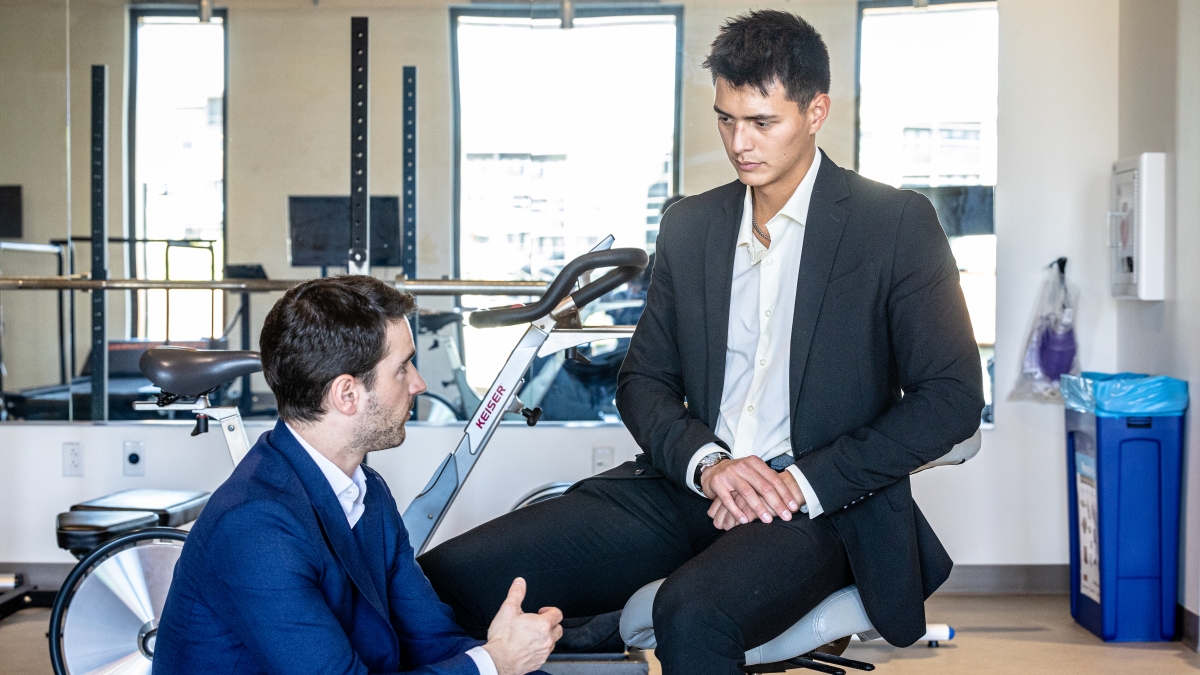Latest Mayo Clinic, ASU MedTech Accelerator cohort indicative of AI integration in health care

Abanza Tecnomed co-founder and CEO Juan Abascal (left) talks with intern and fourth-year Edson College of Nursing student Ryan Ellazar about his company's ACL implantable fixation device as part of the fourth ASU MedTech Accelerator cohort in 2023. Photo by Charlie Leight/ASU News
Editor’s note: This story is featured in the 2024 year in review.
Mayo Clinic in Arizona and Arizona State University will kick off the fifth cohort of the MedTech Accelerator on March 17.
The accelerator brings together leaders in innovation from across the globe and health care industry to advance their products, knowledge and value propositions in one of the nation’s fastest-growing biomedical hubs — Arizona.
The accelerator provides emerging companies with a multiday immersive curriculum in health care entrepreneurship, including: lectures and workshops with world-class scientific and engineering experts; resources to navigate regulatory pathways; and tools for product commercialization and customer acquisition. Additionally, participants attend mentoring, business development and networking events.
“One of the most rewarding aspects of our accelerator program is the hands-on experience our students receive,” said Rick Hall, co-managing partner of the MedTech Accelerator and ASU emeritus professor. “This year we will have representation from our National Science Foundation Research Traineeship interning with the program.
"These students, whose graduate work is focused on the design and manufacturing of medical devices, will obtain a level of hands-on experience rarely offered at this level of study.”
After the two-week curriculum portion of the program, the cohort will remain a part of the MedTech Accelerator support network, allowing continued collaboration and guidance.
“Now that we are in our fifth cohort of the accelerator, we have a bit of history to look back on and can see how the accelerator acts as an indicator of sea-change in the MedTech industry,” said Dr. Steven Lester, medical director for Mayo Clinic’s Discovery Oasis and co-founder and chief medical officer of the MedTech Accelerator. “Just last year we identified that AI was about to become a key focus in the medical innovation space, and this year nearly a third of our cohort companies have AI at the center of their product design.”
Arizona’s reputation as a medical destination and biotech ecosystem continues to rise. Most recently, ASU and Mayo Clinic received grant monies from the Flinn Foundation to fund a new interinstitutional Division of Medical Engineering to develop a best-in-class learning and innovation ecosystem where faculty, clinical staff and students collaborate to solve real-world clinical problems.
“The diversity of this cohort is representative of the deep collection of medtech capabilities being developed around Greater Phoenix,” said Chris Camacho, Greater Phoenix Economic Council president and CEO. “It’s invigorating to see how this accelerator is changing the market and providing these companies opportunities to develop their products and truly make a difference in the sphere. We’re seeing the future of medical care develop before our eyes.”
This year’s participating companies span a wide range of solutions across wellness, health care and medicine.
Aavia
New York
Aavia is an app that empowers patients to track more than 30 physical, mental and emotional hormone health indicators for detailed monitoring and heightened self-awareness. This enables precise daily symptom prediction for a personalized, scientifically informed experience. The use of Aavia by patients gives health care providers comprehensive and real-time data about their patients’ hormone health, enabling prompt and informed care responses.
Brain Navi
Taiwan
Brain Navi is an innovative medical device company with a particular focus on surgical robotic systems. Besides the flagship neurosurgical navigation robot NaoTrac, the company’s product pipeline includes KrystoLens (a single-use neuro-endoscope) and another surgical robot in the R&D stage, which is yet to be announced.
Galileo Group
Florida
Galileo has performed approved pre-clinical research and collected hundreds of live patient on-site scans to develop a science-grade database, detection algorithms and skin response models. Specialized capabilities and resources are in continued development and include: human tissue spectral signatures with reference pathology, skin surface imaging for lesion detection, skin cancer mapping and skin radiation effects measurement, sub-surface vascular imaging, and multisensor measurement and data fusion for 3D body mapping.
JelloX
Taiwan
JelloX, is at the forefront of innovation in the pathology space. Its patented 3D digital pathology tissue imaging with AI-empowered analysis translates into a precision diagnosis solution. The aim is to create the world's first 3D digital pathology solution in support of precision cancer diagnosis, optimize patient treatment outcome, and match the right patients with the right drugs at the right time.
MiiCare
United Kingdom
The MiiCare team believes everyone should be able to live the life they choose from the comfort of home and not have to worry about their health as they age. To power this independent lifestyle, a preventative care platform collects and converts comprehensive sensor data into actionable wisdom for providers to personalize effective care plans at scale. Monica, a conversational AI health coach, then supports older adults to self-care at home in an empowering aging experience that extends life span.
Mindsigns Health
Singapore
Mindsigns Health is a global provider of an AI-powered platform that monitors brain disorders and mental illnesses. Mindsigns Health develops secure health care products that meet the needs of both clinicians and patients to improve the patient journey and empower the doctor-patient relationship.
NeuroBrowser is an automated EEG analysis software that interprets and analyzes electrical abnormalities in neurological disorders such as epilepsy and the monitoring of patients in clinical and ambulatory environments.
GenMind captures audio and other digital signals outside clinical and office settings to enable the remote monitoring of negative symptoms and cognitive impairment, which are biomarkers associated with a number of serious mental illnesses, in order to deliver a continuum of care, improve access and help increase compliance.
NurseIO
Arizona
NurseIO is an app-based technology platform that connects health care professionals looking for flexible work to open per diem shifts within their local vicinity. NurseIO provides clinicians a path to follow their passion of taking care of patients on their own terms and, in turn, we provide health care facilities vetted, qualified and experienced clinicians to fill gaps when needed.
Paldara Pharmaceuticals
Oklahoma
Paldara is developing the next generation of antimicrobial medical device coatings. A primary indication is as a hydrogel coating for urinary catheters in order to prevent up to 99% of catheter-associated urinary tract infections (CAUTIs), the most common hospital acquired infection.
Roddy Medical
Wisconsin
Roddy Medical’s SecureMove-TLC is a single-patient use medical device designed to secure and manage different types of medical tubes, lines and cords to support patient therapy efficiency and improve medical line management and safety. The tension mitigation device is designed to eliminate hazardous pulling and line/cord dislodgement during therapy, transport and patient movement, unlike any existing products, providing hospital cost savings.
Scaled Insights
Ontario, Canada
Scaled Insights is a developer of behavioral AI software designed to understand human behavior and help doctors to nudge their patients toward healthier pathways. The company's software reduces a small sample of the human language down to personality profiles that include multiple variables (based on the big five personality attributes), and then clusters people into "personas" groups, enabling models that determine how to nudge people in each unique personality group to influence healthy behavior choices.
More Health and medicine

College of Health Solutions launches first-of-its-kind diagnostics industry partnership to train the workforce of tomorrow
From 2007 to 2022, cytotechnology certification examinees diminished from 246 to 109 per year. With only 19 programs in the United States, the cytology workforce that stands at the front line of…

ASU's Roybal Center aims to give older adults experiencing cognitive decline more independence
For older people living alone and suffering from cognitive decline, life can be an unsettling and sometimes scary experience.Arizona State University is out to improve that experience.Two projects…

Dynamic data duo advances health research
The latest health research promises futuristic treatments, from cancer vaccines to bioengineered organs for transplants to medical nanobots. While these technologies may one day be…

